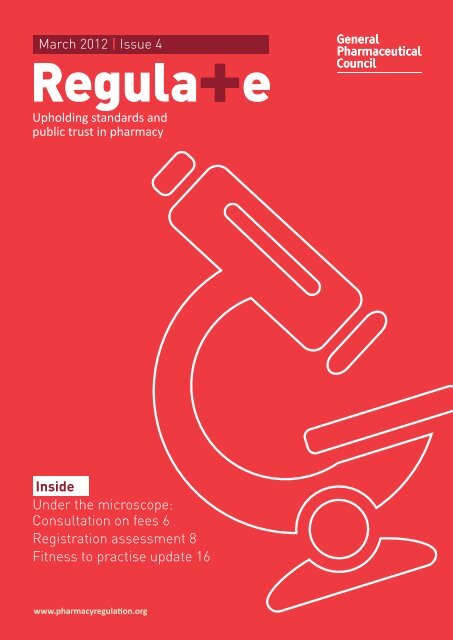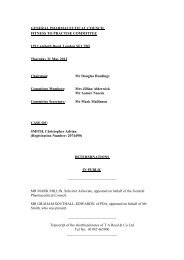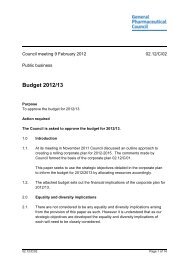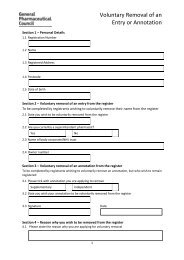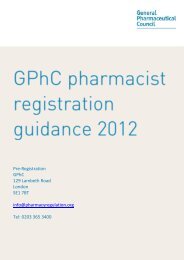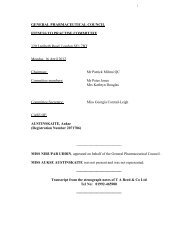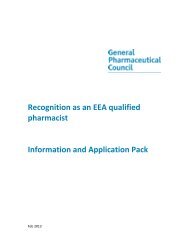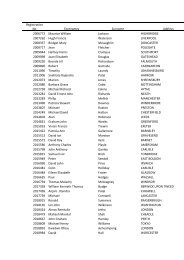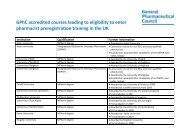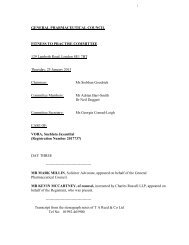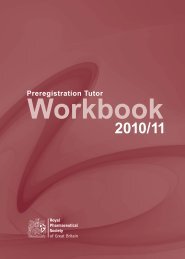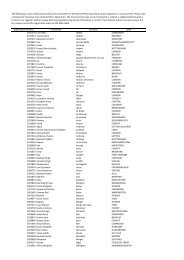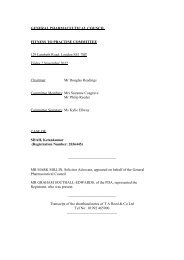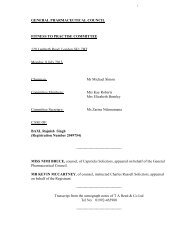Regula+e - General Pharmaceutical Council
Regula+e - General Pharmaceutical Council
Regula+e - General Pharmaceutical Council
You also want an ePaper? Increase the reach of your titles
YUMPU automatically turns print PDFs into web optimized ePapers that Google loves.
March 2012 | Issue 4<br />
Upholding standards and<br />
public trust in pharmacy<br />
Inside<br />
Under the microscope:<br />
Consultation on fees 6<br />
Registration assessment 8<br />
Fitness to practise update 16<br />
www.pharmacyregulation.org
Contents<br />
From the chair 2<br />
Registrant update<br />
- falsifying prescriptions 3<br />
- communicating with us 3<br />
- update on dispensing errors 4<br />
- planning for the London<br />
Olympics 4<br />
Around Great Britain<br />
- gathering in Scotland 5<br />
- modernising regulations<br />
in Wales 5<br />
Consultation on renewal fees 6<br />
This year’s registration<br />
assessment 8<br />
Recruiting to the<br />
accreditation panel 10<br />
Law Commission<br />
regulation review 11<br />
Round up on registered<br />
pharmacies 12<br />
Letters 16<br />
Fitness to Practise update 16<br />
Fitness to Practise<br />
- determinations 17<br />
- learning 18<br />
<strong>Regula+e</strong> is the registrant bulletin of the<br />
<strong>General</strong> <strong>Pharmaceutical</strong> <strong>Council</strong>.<br />
It is sent to all registrants (at the time of<br />
posting) and pre-registration trainees. At<br />
times we may approach external<br />
organisations or individuals to submit an<br />
article or opinion on a topical issue. All<br />
articles and letters commissioned, written<br />
or submitted are subject to editorial control<br />
and may not be printed in full or with<br />
reference back to source.<br />
If you would like to contact the editor or<br />
submit a letter or comment to <strong>Regula+e</strong><br />
please contact us at:<br />
regulate@pharmacyregulation.org<br />
The Editor, <strong>Regula+e</strong><br />
<strong>General</strong> <strong>Pharmaceutical</strong> <strong>Council</strong><br />
129 Lambeth Road | London | SE1 7BT<br />
<strong>General</strong> <strong>Pharmaceutical</strong> <strong>Council</strong> ©2012<br />
From the chair<br />
Our consultation on registered<br />
pharmacies is well underway and it’s<br />
been heartening to see high levels of<br />
engagement with these proposals. We<br />
are only half-way through the<br />
consultation and already we have<br />
received 119 responses.<br />
The national launch provided us with<br />
the opportunity to talk to the leaders<br />
of over 20 national organisations and<br />
to start fleshing out the benefits and<br />
challenges which these proposals<br />
present. Participants recognised that<br />
the proposals represent a big shift from<br />
detailed standards to an outcomesfocused<br />
approach, and this generated<br />
a lot of comment and questions. Our<br />
first consultation events in Scotland and<br />
Wales were also well attended and<br />
raised a number of issues which we<br />
will think carefully about as we prepare<br />
our response to the consultation,<br />
which will be considered at our June<br />
council meeting.<br />
We will be attending a number of<br />
meetings and events to talk about the<br />
consultation proposals over the next<br />
few months, and you would be welcome<br />
to attend. You can find out more on<br />
page 14.<br />
We are also consulting on proposals to<br />
reduce renewal fees by 10 per cent for<br />
pharmacists and pharmacy technicians<br />
from 1 October. That consultation ends<br />
on 8 May, and a decision on any new<br />
level of fees will be made at our June<br />
council meeting. Details about that<br />
consultation are on page 6.<br />
And the Law Commission has started<br />
its consultation on the regulation of<br />
healthcare professionals. This work is<br />
important for all the regulators, not just<br />
a new one like the GPhC. We will be<br />
responding to the consultation and<br />
encouraging others to do the same.<br />
There is more on page 11.<br />
For those trainees seeking to become<br />
pharmacists, the June registration<br />
assessment is not far away. This year we<br />
have increased the number of venues<br />
and made some changes to the<br />
registration assessment process. We will<br />
be sending our spring pre-registration<br />
bulletin out in April, but have included<br />
some key points in this edition of<br />
<strong>Regula+e</strong>, to help with preparation<br />
and planning.<br />
We are also recruiting for new members<br />
of our Accreditation and Recognition<br />
Panel, and for the first time, want to<br />
include pre-registration trainees on our<br />
panels. You can read more on page 10.<br />
This edition of <strong>Regula+e</strong> has arrived with<br />
the last of the four guidance documents<br />
we have developed to expand on our<br />
standards of conduct, ethics and<br />
performance. This fourth in the series<br />
covers confidentiality.<br />
Thanks to those of you who have been in<br />
touch to tell us what you think of<br />
<strong>Regula+e</strong>. Can I encourage you to<br />
continue to share your thoughts with us<br />
at regulate@pharmacyregulation.org<br />
Bob Nicholls<br />
Chair<br />
regulate@pharmacyregulation.org<br />
2 <strong>Regula+e</strong>: March 2012 | Issue 4
Registrant update<br />
Falsifying<br />
prescriptions<br />
Recent complaints raised with the GPhC<br />
by pharmaceutical manufacturers<br />
indicate that a number of registrants<br />
may have passed their pharmacy<br />
account details to third<br />
parties/wholesalers.<br />
It has been alleged that these third<br />
parties are utilising these account details<br />
to submit orders for medicines to<br />
pharmaceutical manufacturers, often<br />
involving the submission of what are<br />
believed to be altered or falsified<br />
prescription forms.<br />
We are currently investigating these<br />
concerns. The outcomes of these cases<br />
have not been decided.<br />
The GPhC’s view is that such action by<br />
registrants could be viewed as<br />
inappropriate and/or misleading.<br />
Registrants should ensure that their<br />
account details are kept secure and<br />
are not passed on inappropriately to<br />
third parties.<br />
Standard 2.2 of the standards of<br />
conduct, ethics and performance, says:<br />
“Make sure that your<br />
professional judgement is not<br />
affected by personal or<br />
organisational interests,<br />
incentives, targets, or similar<br />
measures”.<br />
Communicating<br />
with us<br />
It may be necessary for GPhC staff<br />
to contact pre-registration trainee<br />
pharmacists from time to time,<br />
usually as part of an ongoing issue.<br />
We do this by phone or email.<br />
It has come to our attention that<br />
some pre-registration trainees have<br />
received phone calls from someone<br />
stating they are from the GPhC and<br />
trying to gain contact and<br />
employment information. It is an<br />
offence to purport to be from a<br />
regulator if you are not.<br />
We will always clearly identify<br />
ourselves and leave a phone<br />
number and email address (which<br />
ends in @pharmacyregulation.org).<br />
If you are not sure that the person<br />
who has called is who they say they<br />
are, please phone us for advice.<br />
You can call us on 020 3365 3400.<br />
Our new guidance<br />
Guidance on confidentiality is included with this edition of <strong>Regula+e</strong>. This is<br />
the last in our recent series of four pieces of guidance which expand on key<br />
areas of our standards of conduct, ethics and performance. The other three<br />
cover consent, maintaining clear sexual boundaries, and raising concerns.<br />
You can read more at<br />
http://www.pharmacyregulation.org/standards/guidance<br />
Guidance<br />
on patient<br />
confidentiality<br />
February 2012<br />
Guidance<br />
on patient<br />
confidentiality<br />
February 2012<br />
Upholding standards and public trust in pharmacy 3
Registrant update<br />
Update on<br />
dispensing<br />
errors<br />
A proposed amendment to the Health<br />
and Social Care Bill seeking a due diligence<br />
defence in the event of a dispensing error<br />
was withdrawn as the Bill made its way<br />
through the final stages of debate in the<br />
House of Lords.<br />
Liberal Democrat peer, Lord Tim Clement-<br />
Jones, had sought an amendment to the<br />
effect that anyone at risk of prosecution<br />
under section 67 of the Medicines Act<br />
would be able to mount a defence that<br />
they had exercised all due diligence to<br />
avoid committing such an offence.<br />
Speaking in the Lords on the withdrawal<br />
of this amendment, Health Minister in the<br />
Lords, Lord Howe, said;<br />
“The Medicines and Healthcare products<br />
Regulatory Agency (MHRA) intends to<br />
carry out a review of sanctions and<br />
penalties in medicines legislation. This will<br />
extend well beyond issues that have<br />
arisen in dispensing errors, but the review<br />
will look at the respective roles of<br />
medicines legislation and professional<br />
regulation in this area.<br />
“The possible role of a due diligence<br />
defence will remain on the table for<br />
consideration in the wider context of this<br />
review. It is worth stressing this point as<br />
due diligence defences have a well<br />
established usage in association with strict<br />
liability offences in many areas of<br />
legislation, including medicines legislation.<br />
“This will be a significant and wideranging<br />
review, and it is important to<br />
ensure that it covers the right ground. The<br />
MHRA would aim to scope the coverage,<br />
conduct and timetable of the review by<br />
September 2012.”<br />
Chief Executive and Registrar,<br />
Duncan Rudkin, said:<br />
“Our view remains that single dispensing<br />
errors, without other significant<br />
aggravating factors, will not amount to a<br />
fitness to practise concern.”<br />
Planning for<br />
the London<br />
Olympics<br />
As part of our planning for the<br />
London Olympics, we have reviewed<br />
the logistics of holding our fitness to<br />
practise hearings In London and at<br />
other locations. We have decided<br />
that from 26 July to 7 September,<br />
our hearings will be held at:<br />
Maple House (first floor)<br />
150 Corporation Street<br />
Birmingham B4 6TB<br />
We will ensure that registrants,<br />
witnesses, advocates, and others<br />
affected by this move are made aware<br />
of this change of location.<br />
The London Olympics will bring an<br />
influx of visitors, staff, and athletes to<br />
Great Britain. Resources to assist with<br />
planning and business continuity<br />
include the Royal <strong>Pharmaceutical</strong><br />
Society’s dedicated webpage at<br />
http://www.rpharms.com/<br />
your-day-to-day-practice/pharmacyand-the-olympics.asp<br />
4 <strong>Regula+e</strong>: March 2012 | Issue 4
Around Great Britain<br />
Gathering in<br />
Scotland<br />
We took our consultation on draft<br />
standards for registered pharmacies to<br />
one of the largest third sector events in<br />
the UK – The Gathering held in Glasgow.<br />
This annual event is in its eighth year<br />
and attracts 3,000 delegates.<br />
Our Director for Scotland, Lynsey<br />
Cleland, and a team from the GPhC,<br />
took the opportunity to speak with<br />
people from a broad range of local<br />
community groups and national<br />
organisations in Scotland.<br />
Many of the delegates represent or<br />
are involved in caring for patients<br />
who frequently use pharmacy services.<br />
We encouraged delegates to take<br />
information about the consultation back<br />
to their organisations.<br />
Lynsey said, “Delegates were also very<br />
interested in finding out more about the<br />
GPhC and the work we do, and to better<br />
understand how our work relates to<br />
their local health communities. In<br />
particular, about what we are doing, as<br />
the regulator for Great Britain, to take<br />
account of the health delivery structure<br />
and health policies in Scotland.<br />
“This was also an excellent opportunity<br />
for us to find out more about the work<br />
of third sector organisations in Scotland<br />
and identify ways that we can more<br />
effectively engage and work with them<br />
in the future.”<br />
If you want to discuss this consultation<br />
or other issues relevant to the GPhC in<br />
Scotland, you can contact<br />
lynsey.cleland@pharmacyregulation.org<br />
Modernising regulations<br />
in Wales<br />
The Welsh Government is consulting on changes to the regulations which<br />
govern the provision of NHS pharmaceutical services in Wales. The consultation<br />
sets out proposals to amend the process by which applications to provide NHS<br />
pharmaceutical services are determined.<br />
Currently, the NHS (<strong>Pharmaceutical</strong> Services) Regulations 1992 apply. These<br />
regulations had also applied in England but were revoked and replaced.<br />
In Wales, a Task and Finish Group reviewed the regulations and made a series<br />
of recommendations, which form the basis of this consultation.<br />
The consultation is proposing that the regulations be revoked and replaced in<br />
Wales with new regulations that consolidate the piecemeal amendments and<br />
additions that have been made over the years, and ensure consistent use of<br />
language, definitions and interpretations.<br />
The consultation also proposes new additions to the regulations, including<br />
simplifying the process of relocating community pharmacies over short<br />
distances and introducing procedures for assessing and managing the fitness to<br />
practices of applicants to the pharmaceutical list, and of existing contractors.<br />
The deadline for responding to the consultation is 27 April.<br />
If you want to contact Darren Hughes, the GPhC’s Director for Wales, about<br />
these Welsh Government proposals or to discuss other issues relevant to the<br />
GPhC in Wales, contact darren.hughes@pharmacyregulation.org<br />
Upholding standards and public trust in pharmacy 5
Fees<br />
Consultation<br />
on reducing<br />
renewal fees<br />
The GPhC is proposing a ten per cent reduction in renewal fees for pharmacists and<br />
pharmacy technicians from 1 October - a reduction of £27 for pharmacists, to £240;<br />
and of £12 for pharmacy technicians, to £108.<br />
This proposal is part of a 12-week consultation on fees which ends on 8 May.<br />
Chief Executive and Registrar, Duncan Rudkin said:<br />
“As an organisation, we are seeking to work as<br />
efficiently and effectively as we can while ensuring we<br />
can fulfil our remit to protect the health and safety of<br />
patients and the public.<br />
“We have delivered efficiency gains over the past year<br />
and have a higher number of registrants than forecast.<br />
These are some of the factors that have created the<br />
conditions for a reduction in renewal fees for<br />
pharmacists and pharmacy technicians.”<br />
6 <strong>Regula+e</strong>: March 2012 | Issue 4
Revalidation<br />
Other proposals in the fees consultation<br />
include:<br />
• the fee for pharmacy premises<br />
remaining unchanged at £221. This is<br />
because we are still developing our<br />
approach to regulating registered<br />
pharmacies and are not yet in a<br />
position to establish the future costs<br />
of this work.<br />
• continuing to charge a 2 per cent fee<br />
for credit card payments. That 2 per<br />
cent represents the typical cost levied<br />
on us by credit card companies for<br />
processing these payments.<br />
In the main renewals period at the<br />
end of 2012, we paid charges of<br />
around £74,000 for transactions by<br />
credit card and recovered around<br />
£47,000 through the 2 per cent<br />
charge. Before the introduction of<br />
that credit card charge, those costs<br />
were shared across all registrants and<br />
pharmacy owners, including those<br />
paying by debit card or annual direct<br />
debit, or by BACS for premises fees.<br />
• where a pharmacy professional has<br />
been removed from the Royal<br />
<strong>Pharmaceutical</strong> Society’s register<br />
following a disciplinary committee<br />
decision, charge an application fee<br />
of £413 for a pharmacist or £283 for<br />
a pharmacy technician to join the<br />
GPhC register.<br />
These applications require detailed<br />
consideration. Last year we<br />
introduced a higher initial registration<br />
fee but now want to introduce a<br />
higher application fee, to reflect the<br />
additional work involved in processing<br />
these applications. The total fee for<br />
joining the register (application fee<br />
plus registration fee) would be<br />
unchanged, which means it would<br />
remain equal to the total payable by a<br />
registrant who is removed from the<br />
GPhC’s register following an FtP<br />
committee decision and who later<br />
applies to join the register.<br />
• adjusting the fees for application for<br />
restoration and restoration itself.<br />
We currently have a flat fee for<br />
applications for restoration to the<br />
register. The restoration fee varies<br />
according to the original reason for<br />
removal from the register, and<br />
whether it applies to a pharmacist,<br />
pharmacy technician or premises.<br />
We believe it would be more logical<br />
to have different application fees<br />
rather than different restoration<br />
feeds, as the additional work to<br />
process certain types of application<br />
has to be done, whatever the<br />
outcome.<br />
The total payable for restoration to<br />
the register (application fee plus<br />
restoration fee) would remain<br />
unchanged.<br />
For the full list of proposed fees for<br />
applications for restoration and<br />
restoration itself, go to:<br />
http://www.pharmacyregulation.org/<br />
sites/default/files/Fees%20rules%20con<br />
sultation%202012.pdf and look at<br />
pages 11 to 15.<br />
The GPhC’s governing council will<br />
consider the outcomes of the<br />
consultation at its June meeting and<br />
make a final decision then on any new<br />
level of fees.<br />
We will publicise that decision on our<br />
website, in the June edition of our<br />
stakeholder e-bulletin, Upda+e, in our<br />
July edition of <strong>Regula+e</strong>, and through<br />
the pharmacy press.<br />
Any changes to the level of fees would<br />
come into force from October 2012.<br />
To find out more, download the consultation paper or<br />
fill in the online questionnaire, go to<br />
www.pharmacyregulation.org/fees-consultation-2012<br />
If you want to print off and fill in the questionnaire, you can<br />
send your completed form to:<br />
Email:<br />
Address:<br />
consultations@pharmacyregulation.org<br />
with the subject “Fees consultation”<br />
Draft 2012 Fees Rule Consultation Response<br />
Governance Team, GPhC<br />
129 Lambeth Road<br />
London SE1 7BT<br />
If your answers take up more than the alloted space,<br />
you can attach extra pages if you wish.<br />
The deadline for responses is close of business on<br />
Tuesday 8 May.<br />
Upholding standards and public trust in pharmacy 7
Registration assessment<br />
June and<br />
September<br />
registration<br />
assessments<br />
The spring pre-registration bulletin will<br />
be sent to all pre-registration trainee<br />
pharmacists in April, setting out details<br />
of preparing for and sitting the June and<br />
September assessments. Here are some<br />
key points.<br />
June assessment - Friday 29 June<br />
Deadline for applications to sit that<br />
assessment is Friday 18 May.<br />
September assessment -<br />
Friday 28 September<br />
Deadline for applications is<br />
Friday 17 August.<br />
London Olympic Games<br />
For anyone taking the assessment in<br />
London, please take account of the<br />
Olympic Games, particularly if you are<br />
arranging travel and/or accommodation.<br />
While the sittings are either side of the<br />
Olympic Games, you may need to book<br />
your travel earlier than originally<br />
planned or even stay overnight, and<br />
accommodation may be more heavily<br />
booked than usual.<br />
Reference sources<br />
These two reference sources are<br />
permitted in the assessment hall for the<br />
afternoon open book paper only:<br />
1. British National Formulary, Edition 62<br />
(September 2011)<br />
2. GPhC standards of conduct, ethics<br />
and performance (September 2010)<br />
What you can bring<br />
into a venue<br />
You can store most of your belongings in<br />
the cloakrooms provided. Once you<br />
enter the assessment hall, you can only<br />
bring in the following items. We have<br />
compiled this list in co operation with<br />
the British <strong>Pharmaceutical</strong> Students’<br />
Association (BPSA):<br />
• water and non-fizzy drinks<br />
• sweets, if you have a cough<br />
• medications or other items, if you<br />
have a medical condition<br />
As well as these, you can have on<br />
your desk:<br />
• HB pencil (or softer shade)<br />
• pencil sharpener<br />
• pencil eraser<br />
• specific reference sources – open<br />
book only<br />
You cannot bring in anything else, and<br />
that includes sweets, fruit and fizzy drinks.<br />
Results<br />
An online pass-list will be available on<br />
the GPhC website on:<br />
Friday 27 July 2012, for the June 2012<br />
assessment<br />
Friday 26 October, for the September<br />
2012 assessment<br />
Registration assessment results will not<br />
be given by telephone or email.<br />
Venues<br />
There are eight venues for the June 2012<br />
assessment and two for the September<br />
resit (see table).<br />
8 <strong>Regula+e</strong>: March 2012 | Issue 4
Registration assessment<br />
June 2012<br />
City<br />
London<br />
London<br />
Manchester<br />
Birmingham<br />
Cardiff<br />
Edinburgh<br />
Leeds/Bradford<br />
Sunderland<br />
Venue<br />
London Hilton Metropole Hotel. This venue<br />
includes an adjustments room.<br />
Bishopsgate Institute<br />
Armitage Centre.<br />
This venue includes an adjustments room.<br />
Birmingham Hilton Metropole Hotel<br />
Motorpoint Arena<br />
Edinburgh Corn Exchange<br />
Abundant Life Conference Centre (ALCC),<br />
Bradford<br />
CitySpace, University of Sunderland<br />
How to get there<br />
Edgware Road tube (2 minute walk) and<br />
Paddington train station (10 minute walk)<br />
Liverpool Street tube and train station<br />
(2 minute walk)<br />
University of Manchester Armitage site.<br />
Bus/taxi from centre of Manchester.<br />
Birmingham International train station and the<br />
National Exhibition Centre (10 minute walk)<br />
Cardiff Central train station (5 minute walk)<br />
Slateford train station on the Edinburgh-Glasgow<br />
train line (3 minute walk) or bus from the centre<br />
of Edinburgh<br />
Bradford Forster Square train station<br />
(5 minute walk)<br />
‘University’ stop on Newcastle Metro<br />
(1 minute walk)<br />
September 2012<br />
City<br />
London<br />
Edinburgh<br />
Venue<br />
London Hilton Metropole Hotel. This venue<br />
includes an adjustments room.<br />
Edinburgh Corn Exchange<br />
How to get there<br />
Edgware Road tube (2 minute walk) and<br />
Paddington train station (10 minute walk)<br />
Slateford train station on the Edinburgh-Glasgow<br />
line (3 minute walk) or bus from the centre of<br />
Edinburgh
Education and accreditation<br />
We want you!<br />
During April and May, we will be<br />
recruiting new members to join our<br />
Accreditation and Recognition Panel.<br />
We will advertise these posts in the<br />
national press.<br />
We are seeking new accreditors to<br />
refresh the panel and broaden the<br />
base of expertise we use.<br />
We are particularly interested in<br />
recruiting people from universities who<br />
work on MPharm degrees and people<br />
who are involved in pre-registration<br />
training who also work at universities.<br />
We want to cover both community and<br />
hospital pharmacy.<br />
The GPhC accredits and recognises<br />
pharmacy courses leading to registration<br />
and annotation. These are:<br />
• Master of Pharmacy (MPharm)<br />
degrees leading to pre-registration<br />
and then pharmacist registration<br />
• Overseas Pharmacists' Assessment<br />
Programmes (OSPAPs) leading to<br />
pre-registration and then pharmacist<br />
registration<br />
• prescribing courses leading to<br />
pharmacist annotation<br />
• competency and knowledge-based<br />
qualifications leading to pharmacy<br />
technician registration<br />
The GPhC also accredits pharmacy,<br />
dispensing and medicines counter<br />
assistants courses. These are:<br />
• dispensing or pharmacy assistants<br />
level 2 courses<br />
• medicines counter assistant courses<br />
The accreditation process involves peer<br />
review, site visits, provider self<br />
assessment and public reports.<br />
Recognition relates to national<br />
qualifications delivered across Great<br />
Britain. We recognise the quality<br />
assurance of the awarding bodies, while<br />
not directly accrediting the specific<br />
providers.<br />
For further details contact Joanne<br />
Martin, Quality Assurance Manager<br />
(Education) at<br />
joanne.martin@pharmacyregulation.org<br />
Pre-registration<br />
trainees to join<br />
accreditation<br />
panel<br />
We plan to further enhance our<br />
accreditation process by recruiting preregistration<br />
trainee pharmacists to join<br />
the Accreditation and Recognition Panel<br />
as newly qualified pharmacists. We will<br />
be advertising shortly, with the aim of<br />
starting to train these recruits in June.<br />
Chief Executive and Registrar, Duncan<br />
Rudkin, said:<br />
“We are keen to have pre-registration<br />
trainees involved in our work in this way<br />
and hope there will be plenty of interest<br />
in this opportunity.<br />
“It is important for us to capture, as part<br />
of our accreditation process, the views<br />
of people who have recently studied at<br />
university and been pre-registration<br />
trainees.”<br />
We plan to recruit up to six trainees to<br />
start panel training in June. They will be<br />
able to start panel work when they<br />
register with the GPhC and begin work<br />
as pharmacists. This will require an<br />
annual commitment of approximately six<br />
days, including preparation work.<br />
All accreditors are paid for the work they<br />
do for us.<br />
For further details or an informal chat,<br />
please contact Joanne Martin, Quality<br />
Assurance Manager (Education) at<br />
joanne.martin@pharmacyregulation.org<br />
10 <strong>Regula+e</strong>: March 2012 | Issue 4
Being proportionate<br />
Law<br />
Commission’s<br />
review of<br />
regulation<br />
Tim Spencer-Lane of<br />
the Law Commission<br />
explains<br />
The Law Commission has recently<br />
launched a consultation on the<br />
regulation of health care professionals in<br />
the UK and social workers in England.<br />
The consultation runs to 31 May. Tim<br />
Spencer-Lane from the Law Commission<br />
provides a brief outline of the key<br />
proposals.<br />
The regulatory bodies covered by the<br />
review include the <strong>General</strong><br />
<strong>Pharmaceutical</strong> <strong>Council</strong>, <strong>General</strong> Medical<br />
<strong>Council</strong>, <strong>General</strong> Dental <strong>Council</strong>, and<br />
Nursing and Midwifery <strong>Council</strong>. The<br />
project is the first trilateral joint project<br />
between the Law Commission, Scottish<br />
Law Commission and Northern Ireland<br />
Law Commission.<br />
The regulators operate within a wide<br />
variety of legal frameworks which have<br />
been agreed and amended by<br />
Parliament in different ways and at<br />
different times over the past 150 years.<br />
A complex legislative landscape has<br />
evolved on a piecemeal basis resulting in<br />
a wide range of idiosyncrasies and<br />
inconsistency in the powers, duties and<br />
responsibilities of each of the regulators.<br />
Our proposed structure would consist of<br />
a single Act of Parliament to provide the<br />
legal framework for the regulators (as<br />
well as the <strong>Council</strong> for Healthcare<br />
Regulatory Excellence). In effect, all the<br />
existing governing statutes and orders<br />
would be repealed.<br />
The broad aim of the proposals is to<br />
enhance the autonomy of the<br />
professional regulators in the exercise of<br />
their statutory responsibilities and<br />
enable the regulators to adopt their own<br />
approaches to professional regulation in<br />
the light of their circumstances and<br />
resources.<br />
This would be achieved largely by<br />
reducing the regulators’ dependence on<br />
the Privy <strong>Council</strong> (and through it, the<br />
Department of Health). The regulators<br />
would be given broad powers to make or<br />
amend rules concerning the exercise of<br />
their functions and governance without<br />
any direct oversight by Parliament or<br />
Government.<br />
However, these broad powers would be<br />
subject to certain safeguards, such as a<br />
duty to consult widely, and<br />
accountability hearings before the<br />
House of Commons Health Committee<br />
and the devolved assemblies. The<br />
Government would also be given default<br />
powers to intervene where a regulator<br />
has failed or is likely to fail to perform<br />
any of its functions.<br />
The consultation extends to all the main<br />
functions of the professional regulators<br />
including establishing and maintaining a<br />
register, and approving and setting<br />
standards for education, conduct and<br />
ongoing practice, and the investigation<br />
and adjudication of fitness to practise<br />
cases. It also extends to business<br />
regulation and the powers and duties of<br />
some of the regulators to register bodies<br />
corporate or regulate businesses, such<br />
as the <strong>General</strong> <strong>Pharmaceutical</strong> <strong>Council</strong>.<br />
The consultation period will last for<br />
three months (the closing date for<br />
responses is 31 May 2012), and the final<br />
report and draft Bill are expected to be<br />
published in 2014.<br />
We emphasise that the proposals in our<br />
consultation paper represent our initial<br />
view about how the law should be<br />
reformed. We will review our proposals<br />
on the basis of the responses received<br />
during the consultation period. We<br />
encourage all readers to respond.<br />
The consultation paper and summary<br />
are available to download from the Law<br />
Commission’s website at:<br />
www.lawcommission.justice.gov.uk/<br />
Tim Spencer-Lane<br />
Upholding standards and public trust in pharmacy 11
Registered pharmacies<br />
National launch<br />
of registered<br />
pharmacies<br />
consultation<br />
Mike Holden, of the National Pharmacy<br />
Association, with Priya Warner, the GPhC’s Head of<br />
Standards and Fitness to Practise Policy.<br />
Leaders from more than 20 national<br />
organisations came together at the<br />
national launch of our consultation on<br />
registered pharmacies in London on<br />
8 February.<br />
Leaders from the key pharmacy<br />
representative bodies, patient<br />
organisations including National Voices,<br />
other health regulators, the Department<br />
of Health, and Kevin Barron MP, Chair of<br />
the All Party Parliamentary Group on<br />
Pharmacy, looked at the main proposals<br />
in the consultation document.<br />
They worked through the proposals in<br />
small groups and discussed what some<br />
of those proposals might mean in<br />
practice for pharmacies, pharmacy<br />
owners and superintendents, pharmacy<br />
staff, patients and the public.<br />
A question and answer session with the<br />
GPhC team ran for nearly an hour and<br />
raised some useful issues about the<br />
proposed draft standards for registered<br />
pharmacies.<br />
For instance, Martin Astbury, the<br />
President of the Royal <strong>Pharmaceutical</strong><br />
Society (RPS), raised the issue of the selfselection<br />
of pharmacy medicines and<br />
whether the consultation proposals<br />
might cause risks to patient safety if they<br />
were implemented.<br />
Mike Holden, Chief Executive of the<br />
National Pharmacy Association (NPA),<br />
asked for more details on how the<br />
inspection model might change, and<br />
what a risk-based approach to<br />
inspection would mean for pharmacies.<br />
There were also a number of detailed<br />
questions on specific areas, including the<br />
supply of veterinary medicines and<br />
registration for temporary premises in<br />
the event of disruption of services<br />
caused by natural disasters.<br />
Questions and comments made<br />
at events and meetings over the<br />
consultation period are being<br />
collected and analysed, and will<br />
be taken into account in<br />
developing our response.<br />
A report setting out our response<br />
will go to the June meeting of the<br />
GPhC council and will be available<br />
on our website<br />
Bob Nicholls, GPhC Chair, with Mark Koziol, from the Pharmacists’ Defence Association.<br />
12 <strong>Regula+e</strong>: March 2012 | Issue 4
Registered pharmacies<br />
In Scotland<br />
In Wales<br />
At the first of our consultation events<br />
in Wales, members of Community<br />
Health Boards from across Wales came<br />
to explore what the consultation<br />
proposals might mean for the patients<br />
they represent. The GPhC’s <strong>Council</strong><br />
member for Wales, Lesley Morgan MBE,<br />
introduced the event.<br />
Professor Roger Walker, the Chief<br />
<strong>Pharmaceutical</strong> Officer for Wales, and<br />
leaders from Scotland’s professional and<br />
representative bodies for pharmacy, had<br />
the opportunity to ask questions of a<br />
panel of GPhC staff, including Director<br />
for Wales, Darren Hughes.<br />
Many of the questions scrutinised how<br />
the proposals would fit with increasingly<br />
diverging healthcare delivery structures<br />
in Wales.<br />
Representatives from pharmacy<br />
professional and industry bodies, the<br />
NHS and patient organisations came<br />
together at the first of our consultation<br />
events in Scotland. Attendees travelled<br />
from as far as Shetland and Inverness to<br />
attend the event and share their views.<br />
The GPhC’s <strong>Council</strong> member for<br />
Scotland, Gordon Dykes, introduced<br />
the event.<br />
The question and answer session with<br />
GPhC staff focused on how the new<br />
standards could work with pharmacy<br />
care and services in Scotland. Panellists<br />
included our Director for Scotland,<br />
Lynsey Cleland.<br />
Top: Alex MacKinnon, Royal <strong>Pharmaceutical</strong><br />
Society, Dr James Johnson, Strathclyde Institute<br />
of Pharmacy, and Dr Jean Turner, Scottish<br />
Patients Association<br />
Bottom: Dr Hamish Wilson and Duncan Rudkin,<br />
the GPhC’s Chief Executive, with Professor<br />
Bill Scott, and Lynsey Cleland, the GPhC’s<br />
Director for Scotland<br />
Paul Worthington, from Cwn Taf<br />
Community Health <strong>Council</strong>, talked<br />
about the inspections carried out by<br />
Community Health <strong>Council</strong>s and asked<br />
whether and how the GPhC and<br />
Community Health <strong>Council</strong>s could<br />
coordinate their inspections to make<br />
sure they did not overlap.<br />
Mair Davis, Chairman of the Welsh<br />
Pharmacy Board of the RPS, asked<br />
how the GPhC would ensure there was<br />
consistency in how inspectors interpreted<br />
the outcomes-focused standards.<br />
Top: Chief <strong>Pharmaceutical</strong> Officer for Wales,<br />
Professor Roger Walker<br />
Bottom: Catherine O’Brien from WCPPE with<br />
Darren Hughes, the GPhC’s Director for Wales<br />
Dr Hamish Wilson, who is leading the<br />
national review of NHS <strong>Pharmaceutical</strong><br />
Care of Patients in the Community, said<br />
that while he thought the proposals<br />
fitted well with what was happening<br />
in Scotland, the final version could do<br />
even more to reflect the different<br />
perspectives in pharmacy across<br />
Scotland, England and Wales.<br />
A key theme that emerged was how<br />
to achieve the best outcomes for<br />
patients using pharmacy services in<br />
Scotland. Professor Bill Scott, the Chief<br />
<strong>Pharmaceutical</strong> Officer for Scotland,<br />
asked how the GPhC had worked with<br />
patients and the public in developing<br />
the proposals.<br />
Dr Jean Turner, from the Scottish<br />
Patients Association, asked if the<br />
standards have a role to play in<br />
encouraging pharmacists to keep good<br />
records, which could be useful,<br />
especially when treating patients with<br />
complex conditions.<br />
Upholding standards and public trust in pharmacy 13
Registered pharmacies<br />
How you can<br />
get involved<br />
We are attending a number of Local Pharmacy<br />
Forum (LPF), Local <strong>Pharmaceutical</strong> Committee<br />
(LPC) and other organisations’ meetings and<br />
events. You may want to attend. You can check<br />
details of dates, times and venues at<br />
www.registeredpharmacies.org/events<br />
Some of these meetings and events include:<br />
England<br />
16 April GPhC (supported by LPC) meeting - Greater Manchester<br />
20/21 April Clinical Pharmacy Congress - ExCel, London<br />
1 May GPhC meeting for superintendent pharmacists and registrants -<br />
East London<br />
Scotland<br />
10 April LPF meeting - Aberdeen<br />
18 April GPhC meeting with registrants and pharmacy owners - Glasgow<br />
19 April LPF meeting - Edinburgh<br />
Wales<br />
16 April LPF meeting - Abergele, North Wales<br />
23 April LPF meeting - Swansea<br />
24 April LPF meeting - Cardiff<br />
You can find our calendar of consultation events at www.registeredpharmacies.org/events<br />
or you can contact us at consultations@pharmacyregulation.org for more information.<br />
You can respond to the consultation online by visiting<br />
www.registeredpharmacies.org.<br />
If you would like a hard copy of the consultation document<br />
and/or questionnaire, you can:<br />
phone : 0203 365 3506<br />
email: consultations@pharmacyregulation.org<br />
Write to:<br />
Registered Pharmacy Consultation<br />
c/o Communications Department<br />
<strong>General</strong> <strong>Pharmaceutical</strong> <strong>Council</strong><br />
129 Lambeth Road<br />
London SE1 7BT<br />
Other formats<br />
There is a Welsh Language version of<br />
this consultation document available at<br />
www.registeredpharmacies.org<br />
You can request an alternative format<br />
by emailing us at<br />
consultations@pharmacyregulation.org<br />
or calling us on 020 3365 3506.<br />
14 <strong>Regula+e</strong>: March 2012 | Issue 4
Letters<br />
Dear Sir/Madam,<br />
I must say I love reading regula+e as the<br />
content is informative and thorough. I<br />
especially enjoy the fitness to practise -<br />
learning. I find this useful as I am a<br />
newly qualified Pharmacy Technician<br />
and want to fully understand all aspects<br />
of pharmacy and best practise.<br />
I would, however, like to see more<br />
information about, and support, on CPD<br />
- possibly including example entries.<br />
Thanks<br />
Richard Lee<br />
Dear Richard<br />
Thank you for your feedback. We are<br />
really pleased to read your comments<br />
about <strong>Regula+e</strong>. We will have a look at<br />
your suggestion. We will be launching a<br />
new online learning tool soon and will<br />
update you about that in the next<br />
edition of <strong>Regula+e</strong>. That item will<br />
include some information about CPD.<br />
In the meantime, you might want to<br />
look at the learning points at the back<br />
of this edition and let us know what<br />
you think about how we have done<br />
them this time.<br />
Editor<br />
Upholding standards and public trust in pharmacy 15
Fitness to Practise update<br />
New policy on<br />
underlying<br />
health issues<br />
The GPhC can now routinely request a<br />
medical examination and report in fitness<br />
to practise cases that are drug or alcoholrelated.<br />
This is part of a new policy,<br />
‘Identifying Underlying Health Issues’,<br />
which was agreed in March, and also<br />
applies to registrants making an<br />
application for registration.<br />
The medical examination is carried out by<br />
an independent practitioner nominated by<br />
the GPhC, who examines the registrant<br />
and provides a written report, including<br />
any relevant test results.<br />
Chief Executive and Registrar, Duncan<br />
Rudkin, said:<br />
“As a result of their working environment,<br />
registrants have access to drugs that are<br />
liable to abuse or misuse. This is a<br />
potential area of risk that needs further<br />
examination.<br />
“As part of implementing this new policy,<br />
we will gather evidence to assess whether<br />
carrying out routine medical examinations<br />
helps to identify risks in terms of<br />
protecting the public. We will review this<br />
policy in six months time to assess what<br />
evidence has emerged.”<br />
This policy applies to all cases received on<br />
or after 13 February 2012, as well as all<br />
applications for registration received on or<br />
after that date.<br />
The GPhC will request a medical report<br />
where applications for registration contain<br />
a specific or related drugs or alcohol<br />
caution or conviction. Whether a medical<br />
report is required will depend on the<br />
specific facts and circumstances in each<br />
case. Applicants who are asked to submit a<br />
medical report will be required to pay the<br />
cost of that report themselves.<br />
The policy will be reviewed in August to<br />
assess its effectiveness in indentifying<br />
underlying health issues which, if not<br />
addressed, might increase risks to patients<br />
and the public.<br />
Keeping in<br />
touch<br />
Not long after we send out <strong>Regula+e</strong>,<br />
the returned copies arrive. Can we<br />
encourage you to keep us updated if<br />
you change your home address. You<br />
can do this by visiting MyGPhC.org<br />
and entering your new home<br />
address. It only takes a few minutes.<br />
We have seen an increasing number<br />
of returned copies of <strong>Regula+e</strong> with<br />
handwritten forwarding addresses on<br />
the outside packaging. We have<br />
assumed that these have been filled<br />
in by new occupants at the old<br />
address. This does not constitute<br />
notifying us of a change of address.<br />
It is a requirement of your<br />
registration that you provide us with<br />
your current home address. Failing to<br />
update your address may result in<br />
you failing to respond as required to<br />
correspondence from the GPhC,<br />
which may ultimately lead to your<br />
removal from the register.<br />
It may also be a factor in a fitness to<br />
practice matter too. If we don’t have<br />
your latest home address, have made<br />
appropriate efforts to contact you at<br />
the address you have provided, and<br />
you haven’t responded or attended a<br />
scheduled hearing, then the<br />
committee may conclude that you<br />
have decided not to attend. We<br />
would like to avoid the disruption and<br />
distress that can be caused when this<br />
happens. A simple change of address<br />
is all that is needed to ensure this<br />
won’t happen.<br />
Please contact our customer service<br />
team if the process of notifying us of<br />
a change of address is still not clear.<br />
You can call us on 020 3365 3400.<br />
And if you have a colleague who has<br />
not received their copy of <strong>Regula+e</strong>,<br />
please ask them to check their details<br />
on MyGPhC.org or call us on 020<br />
3365 3400.<br />
16 <strong>Regula+e</strong>: March 2012 | Issue 4
Fitness to Practise - determinations<br />
Fitness to<br />
Practise –<br />
determinations<br />
Should a fitness to practise committee<br />
determine that a registrant’s fitness to<br />
practise is impaired, the committee may<br />
impose a sanction that is proportionate to<br />
the conduct that has been found proven.<br />
This may include, for example, issuing a<br />
warning, placing conditions on the<br />
individual’s registration, suspension of<br />
registration or, in the most serious cases,<br />
erasing the individual from the register so<br />
that they can no longer practice.<br />
The matters listed here include the<br />
registrant’s registration number, date of<br />
determination and the sanction.<br />
Determinations of the facts and additional<br />
information about the hearings can be<br />
found on our website at<br />
www.pharmacyregulation.org/search/<br />
search_decisions<br />
Gulamhusein, Charlotte, 2052358<br />
Determination date 16 January 2012<br />
Suspension for one month<br />
Emohare, Jude Isibor, 2066515<br />
Determination date 20 January 2012<br />
Conditions placed on registration for six<br />
months, to be reviewed before the end<br />
of the six month period<br />
Aujla, Sukhjinder Singh, 2059794<br />
Determination date 24 January 2012<br />
Suspension for two months<br />
Akram, Shahnawaz, 2045100<br />
Determination date 24 January 2012<br />
Suspension for two months<br />
Morsy, Ramsey Sobhy, 2042254<br />
Determination date 24 January 2012<br />
Suspension for 12 months<br />
Peploe Williams, Anthony, 2026041<br />
Determination date 30 January 2012<br />
Suspension for 12 months, to be<br />
reviewed before the end of the 12 month<br />
period<br />
O’Sullivan, Simon Patrick Joseph,<br />
2040785<br />
Determination date 3 February 2012<br />
Suspension for six months<br />
Shekoni, Mufutau Olawale Alade,<br />
2021866<br />
Determination date 6 February 2012<br />
Review hearing in respect of a six month<br />
suspension previously imposed on<br />
registration. Direction that on the expiry<br />
of the current period of suspension,<br />
registration will be conditional on<br />
compliance with conditions which must<br />
be completed within 12 months<br />
Taylor, Stacey, 5001370<br />
Determination date 10 February 2012<br />
Review hearing in respect of a 12 month<br />
suspension previously imposed on<br />
registration. Further suspension of 12<br />
months with a review before the end of<br />
that period<br />
Thomas, Lisa Ellen, 5001076<br />
Determination date 13 February 2012<br />
Suspension for six months, with a review<br />
before the end of the suspension period<br />
Mistry, Vijay, 2032315<br />
Determination date 14 February 2012<br />
Suspension for 12 months, with a review<br />
before the end of the suspension period<br />
Ivanov, Emil<br />
Determination date 6 March 2012<br />
Conditional registration for 12 months<br />
Bal, Narinderpal<br />
Determination date 8 March 2012<br />
Suspension for two months<br />
Lal, Roshan<br />
Determination date 15 March 2012<br />
Suspension for 12 months, with a review<br />
before the end of the suspension period<br />
You can find out more about the role of the investigating committee at:<br />
http://www.pharmacyregulation.org/raising-concerns/hearings/committees/investigating-committee<br />
And about the fitness to practise committee at<br />
http://www.pharmacyregulation.org/raising-concerns/hearings/committees/fitness-practise-committee<br />
Our threshold criteria can be found at: http://www.pharmacyregulation.org/sites/default/files/The%20threshold%20criteria.pdf<br />
Upholding standards and public trust in pharmacy 17
Fitness to practise – learning<br />
Fitness to<br />
practise –<br />
learning<br />
We receive concerns about<br />
pharmacy professionals from<br />
a wide variety of sources.<br />
Some of the concerns fall<br />
below our threshold criteria<br />
and so do not get referred on<br />
to our investigating<br />
committee or fitness to<br />
practise committee. Cases<br />
are only referred to these<br />
committees where there is<br />
reason to believe that the<br />
registrant’s fitness to<br />
practise may be impaired.<br />
We are keen to share<br />
learning from a variety of<br />
cases to improve practice<br />
and for registrants to better<br />
understand how we deal<br />
with these matters.<br />
Sometimes we have cases where the<br />
circumstances seem similar but the<br />
outcomes quite different. Here we look<br />
at two sets of examples. The first<br />
involves practising while not registered;<br />
and the second, making false claims for<br />
Medicine Use Review (MURs).<br />
First prosecution for<br />
practising while not<br />
registered<br />
The GPhC has successfully brought its<br />
first prosecution against a pharmacist<br />
for practising while suspended from<br />
the register.<br />
Mark Robert Taylor (registration number<br />
2039228) was convicted of an offence<br />
under S38(4) of the Pharmacy Order 2010<br />
at Tower Bridge Magistrates Court on 9<br />
January 2012 and fined £1,750 plus costs.<br />
Our fitness to practise committee had<br />
suspended Mr Taylor’s registration on 9<br />
June 2011 for six months, after a<br />
number of allegations were found<br />
proved during a hearing. These<br />
allegations included accessing the<br />
controlled drugs cabinet when not on<br />
duty and without authorisation, and<br />
demonstrating unprofessional and<br />
threatening behaviour to a colleague.<br />
A GPhC Inspector conducting a routine<br />
inspection of a pharmacy on 14 July<br />
2011 found that Mr Taylor had<br />
unlawfully been working there during his<br />
period of suspension.<br />
Chief Executive and Registrar, Duncan<br />
Rudkin, said:<br />
“This conviction sends a clear message<br />
that there are serious consequences if<br />
someone tries to work as a pharmacist<br />
when they are not registered to practise.<br />
“Patients and the public can have<br />
confidence that we will take decisive<br />
action to prevent anyone from practising<br />
as a pharmacist if they do not meet the<br />
high standards of conduct, ethics and<br />
performance necessary to hold<br />
registration.”<br />
Practising while not<br />
registered<br />
The fitness to practise committee heard<br />
that a pharmacist who had been<br />
removed from the register for failing to<br />
renew his registration had worked as a<br />
locum on 43 occasions between 8 April<br />
and 18 June 2009.<br />
He had not told his employers that he<br />
had been removed from the Register. As<br />
far as he was aware, the companies he<br />
worked for believed he was a registered<br />
pharmacist.<br />
The committee heard that at the time of<br />
the offences, he had felt overwhelmed<br />
by debt. His motivation had been to try<br />
and get his financial affairs into a<br />
manageable state.<br />
He accepted that his behaviour had<br />
been both inappropriate and dishonest.<br />
The committee took into account that<br />
while the misconduct had occurred over<br />
a two-month period, it had to be seen in<br />
the context of an otherwise<br />
unblemished record. He had cooperated<br />
fully with the GPhC’s investigation and<br />
had made open and frank admissions.<br />
He had apologised for his misconduct<br />
and shown genuine remorse.<br />
A two-month suspension was imposed,<br />
which the committee said adequately<br />
reflected the aggravating and mitigating<br />
features of the case.<br />
Learning points<br />
• You cannot call yourself a<br />
pharmacist, practise as a<br />
pharmacist or hold yourself out to<br />
be a pharmacist unless you are<br />
registered with the GPhC<br />
• It is your responsibility to renew<br />
your registration annually before<br />
the deadline<br />
• The owner or superintendent<br />
pharmacist must carry out<br />
relevant checks on all staff that<br />
they employ. The registration<br />
status of a pharmacist or<br />
pharmacy technician can be<br />
checked on our live register on<br />
our website. Go to<br />
http://www.pharmacyregulation.<br />
org/registration<br />
• Our register also shows details of<br />
any fitness to practise decisions<br />
relating to a registrant.<br />
18 <strong>Regula+e</strong>: March 2012 | Issue 4
Fitness to practise – learning<br />
Making false claims for<br />
MURs: Case one<br />
The fitness to practise committee heard<br />
allegations that a pharmacist had made<br />
false claims for Medicine Use Reviews<br />
(MURs) that had resulted in an<br />
overpayment of £22,000 to the pharmacy<br />
and a personal bonus to the pharmacist of<br />
£800. The false claims had occurred over a<br />
two-year period and his employer had<br />
been obliged to pay back the £22,000.<br />
The pharmacist had claimed for eight<br />
MURs per week, whether or not he had<br />
done them.<br />
The committee said the pharmacist’s<br />
evidence on how many MURs he had<br />
carried out was unclear and at times,<br />
contradictory. On the balance of<br />
probabilities, they said that approximately<br />
20 per cent had not been carried out at<br />
the time a claim was made.<br />
The pharmacist had also made no record<br />
on his employer’s computer system, as<br />
required by his employer.<br />
The committee said the pharmacist had<br />
treated the dishonest reporting and<br />
claiming of MURs as an insignificant matter<br />
and had denied his dishonesty up to a very<br />
late stage in the investigation, and it was<br />
“extremely concerned” about his apparent<br />
lack of insight into his misconduct.<br />
The committee accepted that the<br />
pharmacist had felt under pressure to<br />
achieve a target of 400 MURs a year, and<br />
that he had experienced some personal<br />
and family problems. There was also no<br />
evidence of any direct risk to patient safety.<br />
However, accuracy and honesty in recordkeeping<br />
was crucial to a pharmacist’s duty.<br />
The committee concluded that his<br />
conduct was not fundamentally<br />
incompatible with registration as a<br />
pharmacist but that a clear message<br />
needed to be sent out about the<br />
unacceptability of his behaviour.<br />
The pharmacist was suspended for 12<br />
months, with a review of the suspension<br />
by another panel of the fitness to practise<br />
committee before the end of that period.<br />
Making false claims for<br />
MURs: Case two<br />
The fitness to practise committee heard<br />
allegations that a pharmacist had<br />
submitted 308 claims for Medicines Use<br />
Reviews (MURs) over a four-month period<br />
which had not been carried out, and as a<br />
result of these claims, had received a<br />
personal bonus of £800.<br />
Over a four-month period, the pharmacist<br />
had claimed that she had completed a<br />
total of 400 MURS, but when asked by the<br />
company pharmacy manager to produce<br />
the documentary evidence, was unable to<br />
do so. There was no evidence she had<br />
done more than 92 MURs.<br />
The pharmacist had initially helped with<br />
the search for evidence that she had<br />
completed the MURs, then had admitted<br />
she had submitted inflated claims, and<br />
repaid the £800.<br />
The committee said the pharmacist<br />
had found herself out of her depth in<br />
fulfilling her responsibilities in her first<br />
non-locum role, and that she particularly<br />
wanted to impress her employers in the<br />
hope of being offered a permanent post.<br />
One way she had decided to do that was<br />
by completing a high number of MURs.<br />
She had accepted that she had acted in a<br />
dishonest manner and had breached the<br />
standards of conduct, ethics and<br />
performance which require pharmacists<br />
to make sure their professional<br />
judgement is not impaired by personal<br />
or commercial interest, incentives,<br />
targets or similar measures.<br />
In deciding on the outcome, the<br />
committee took into account the early<br />
repayment of the £800; that the events<br />
had taken place over a short period; that<br />
the pharmacist was not motivated by<br />
personal financial gain; and that there<br />
was no actual harm to patients or to the<br />
public. The pharmacist had shown<br />
insight by accepting her wrongdoing and<br />
showing remorse. She had no record of<br />
previous wrongdoings, and testimonials<br />
considered by the committee spoke<br />
highly of her care, kindness and<br />
professionalism.<br />
The committee said a lengthy<br />
suspension would be a disproportionate<br />
interruption to her career, and due to<br />
the insight shown, imposed a onemonth<br />
suspension.<br />
Learning points<br />
• You must always act with honesty<br />
and integrity<br />
• You must cooperate with<br />
investigations, acknowledge when<br />
your practice is inappropriate and<br />
reflect on how your practice<br />
should be improved or changed<br />
• You must not make claims for<br />
services that you have not carried<br />
out, even if you intend to carry<br />
them out in the near future<br />
• You must make necessary records,<br />
to show a clear audit trail of the<br />
services that you have carried out,<br />
and to comply with any<br />
requirements that may apply<br />
under your NHS contract<br />
• You must make sure that your<br />
professional judgement is not<br />
affected by having to achieve<br />
targets set in the course of your<br />
employment<br />
• If you feel under undue pressure<br />
to meet certain targets that have<br />
been set for you, you should raise<br />
this with your manager or<br />
superintendent pharmacist<br />
Upholding standards and public trust in pharmacy 19
Check that a pharmacy professional is registered:<br />
http://www.pharmacyregulation.org/<br />
theregister/index.aspx<br />
Copies of <strong>Regula+e</strong> are available to download from<br />
our website www.pharmacyregulation.org/publications<br />
We welcome feedback and comments on<br />
this publication which can be sent to<br />
regulate@pharmacyregulation.org<br />
<strong>General</strong> <strong>Pharmaceutical</strong> <strong>Council</strong><br />
129 Lambeth Road | London | SE1 7BT<br />
Telephone: 020 3365 3400<br />
Email: info@pharmacyregulation.org<br />
Designed and produced by Tangerine UK


